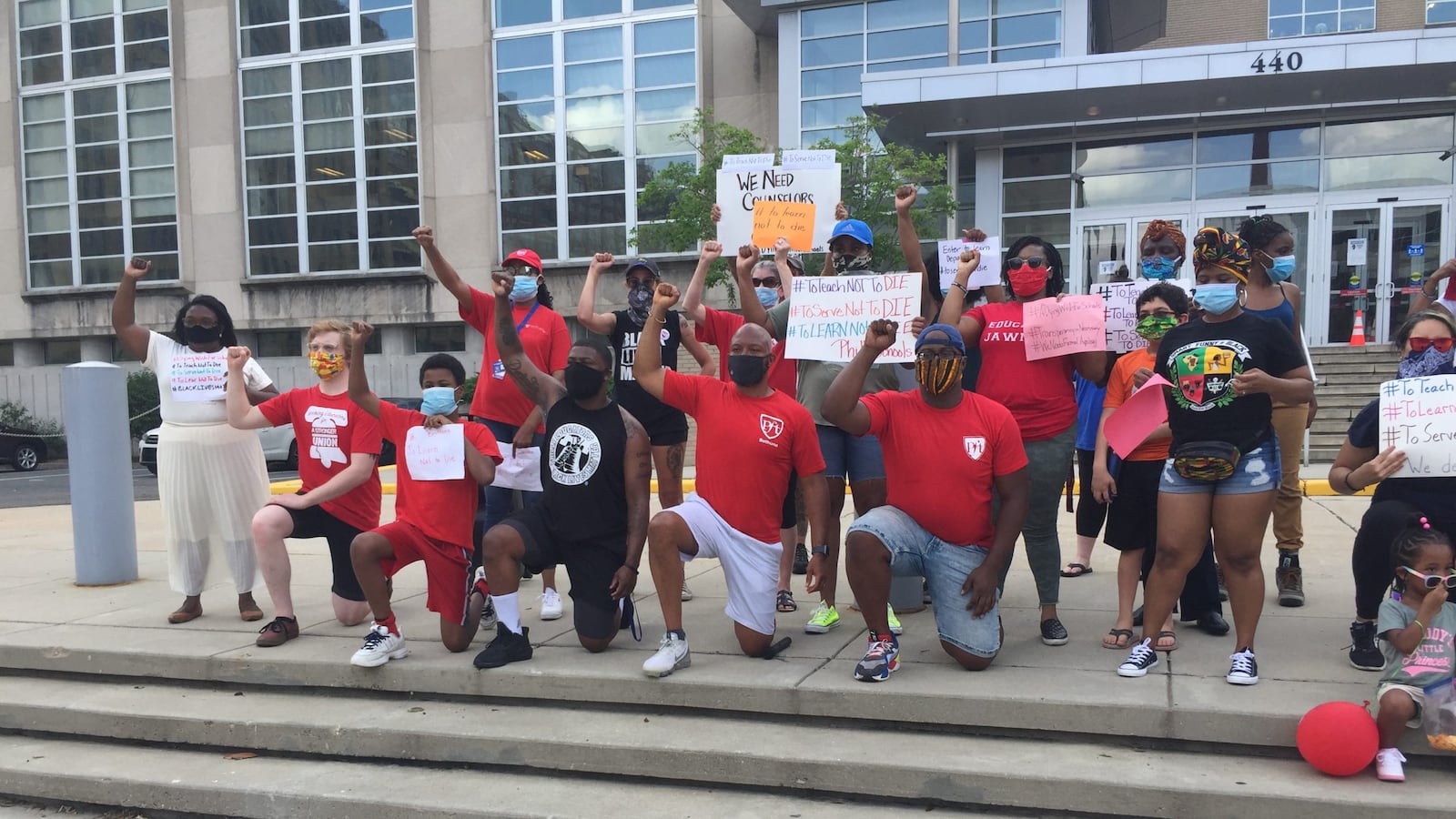This article was originally published in The Notebook. In August 2020, The Notebook became Chalkbeat Philadelphia.
During the 2019-20 academic year, several schools in the Philadelphia School District closed due to exposed asbestos. After Minneapolis police killed an unarmed black man on May 25, Philadelphia and dozens of other cities and towns erupted in protest.
Those two issues came together Wednesday in a protest at District headquarters, where a cohort of teachers from the Philadelphia Federation of Teachers’ Caucus of Working Educators and teachers from Mary McLeod Bethune Elementary in North Philadelphia demonstrated against systemic racism and health hazards in Philadelphia schools. The crowd held signs that said “black lives matter” and “I can’t breathe,” which were among George Floyd’s last words as a Minneapolis officer knelt on his neck.
Organizer Herman Douglas, a 7th-grade teacher at Bethune, said the quote “I can’t breathe” especially resonated in Philadelphia schools, citing teacher Lea DiRusso, who contracted mesothelioma, a respiratory disease linked to asbestos exposure.
“We will not stand for asbestos in our black and brown schools,” Douglas said.
Asbestos was commonly used as insulation in buildings for much of the 20th century, but it is dangerous if it becomes loose and fibers enter the air. It was banned in the 1970s.
Douglas and other educators made their demands clear. They want a formal apology from the District, free health care for students and staff who have been exposed to loose asbestos, and a new Bethune school building designed by the community.
Two months ago, while schools were closed, workers began the process of removing dangerous asbestos from the ceilings at Bethune. The protesters said that the District is botching the cleanup. When environmental staff collected air samples, they said, the gymnasium, where the workers started, still contained alarmingly high levels of asbestos. And air samples collected in the school hallways contained asbestos levels five to 10 times higher than what is considered safe by health officials. All this happened while the school was being used as a pickup site for student meals.
When students and staff showed up in April for Chromebook distribution, workers walked “around in hazmat suits, looking like astronauts,” Douglas said. At the time, staff had not been informed of the asbestos work.
“We are worthy of the same building conditions like they have in Lower Merion and Doylestown,” City Councilwoman Kendra Brooks said to cheers from the crowd. “We have been fighting around the issue of asbestos and lead in our schools for years. … The system has failed us.”
Emily Seiter, the school nurse at McClure Elementary, said her school was closed for more than a month due to asbestos. School staff had to pressure the District to close the school twice to ensure all the health hazards were removed.
“School conditions are a public health crisis,” Seiter said. “They’ll say there’s no money, but when we stand up together and take action, suddenly they find that money.”
One Bethune teacher echoed Seiter’s point and accused the city of spending too much money on police instead of on education where the funds are badly needed.
“The District can give a police department millions of dollars,” the teacher said. “If those millions went to the right place and right spaces, we wouldn’t be out here protesting.”
A number of students also came to show their support. Yamir Knight-Parker, a 6th grader at Duckrey Elementary, attended the protest to show that “students care and everybody else needs to care” about systemic racism and asbestos contamination in Philadelphia’s public schools.
Ultimately, Knight-Parker said, these issues distract students from what’s most important in their lives — school.
“With all this stuff going on, it can be really difficult for students to learn and focus on what they can do to help their future,” Knight-Parker said.

